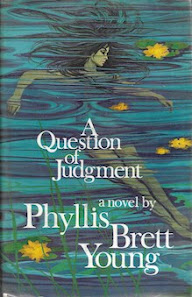Victor Lauriston
Toronto: McClelland & Stewart, 1922
292 pages
The Twenty-first Burr is a mystery novel populated in part by characters with assumed names and hidden identities. It begins with twenty-year-old Laura Winright's rushed return to North America after two years touring Europe. I've read enough old novels to know that such a young lady would not have been been permitted to go off alone to the Old World. That Laura did so – and in the midst the Great War – is a mystery left unexplained and unexplored.
"Was she a spy?" asks my wife.
Good question.
Our heroine's haste has everything to do with a telegram sent by her father, Detroit department store baron Adam Winright. Laura never lived in the Motor City, rather she was raised at the family mansion, Castle Sunset, at Maitland Port (read: Goderich, Ontario) on the shore of Lake Huron.
Oh, see here, chick! You've come down on us like the wolf on the fold. We haven't time to send out for crackers and cheese. Of course your father is just fine and dandy. Why shouldn't he be?But Adam Winright is not fine and dandy. By the time Laura reaches Maitland Port, her father is dead.
The worst thing about The Twenty-First Burr is that it shows such promise, yet was Lauriston's only mystery. McClelland & Stewart used the plates from George H. Doran's American edition. Neither publisher went back for a second printing.
Lauriston spent his royalties on buying those same plates. He hoped that they would one day be used in returning the novel to print. An author's fantasy, it ended in 1941 when they were sold for use in the war effort.
 |
| The Windsor Daily Star, 21 August 1941 |
The accompanying article – 'Chatham Writer's Dream Shattered After 19 Years' – begins:
Sale of 700 pounds of lead and copper plates in New Britain, Connecticut, recently, put an end to a dream that has lived in the persevering mind of Victor Lauriston, Chatham novelist, ever since he sold his first book 19 years ago. He had hoped sometime to use the plates for a reprint of the book, "The Twenty First Burr," [sic] a detective story.Lauriston lived well into old age, dying two days after his ninety-second birthday, yet he wrote only one more novel. A roman à clef titled Inglorious Milton, according to the Border Cities Star (20 October 1934), it "set every tongue in Chatham wagging." Lauriston's papers hold the manuscript, along with numerous letters of rejection. The novel was finally published by the Tiny Tree Club, a branch (sorry) of Chatham's literary society. I've not read it, but should. The Border City Star article compares it to Joyce's Ulysses.
Metal in the plates will be melted to help win the war. Owing to exchange regulations, proceeds of the sale will go to pay a 16 years' storage bill.
I can only assume society members are portrayed in a flattering light.
Object: Light brown boards with black impressing. The jacket illustration is by Margaret Freeman. My copy once belonged to a woman named Olive Shanks.
At the time of the 1921 census, Miss Shanks, then age 29, lived with her parents (John and Hattie) and siblings (Bessie and Mark) at 146 Park Street, Chatham, Ontario.
 |
| 146 Park Street, Chatham, Ontario November 2020 |
In 2019, her copy ended up in my home, having been purchased from bookseller David Mason. Price: $90.00.
Access: The Twenty-First Burr was published by Doran in the United States and in Canada by McClelland & Stewart. Neither edition enjoyed a second printing. As of this writing, two copies are listed for sale online, both from London booksellers: London, Ontario's Attic Books offers a jacketless copy of the Doran edition at US$35.00; London, England's Any Amount of Books is asking £30.00 for its jacketless Doran. The McClelland and Stewart edition is nowhere in sight.
Sixteen of our academic libraries hold copies of one edition or the other, as does Library and Archives Canada.











































